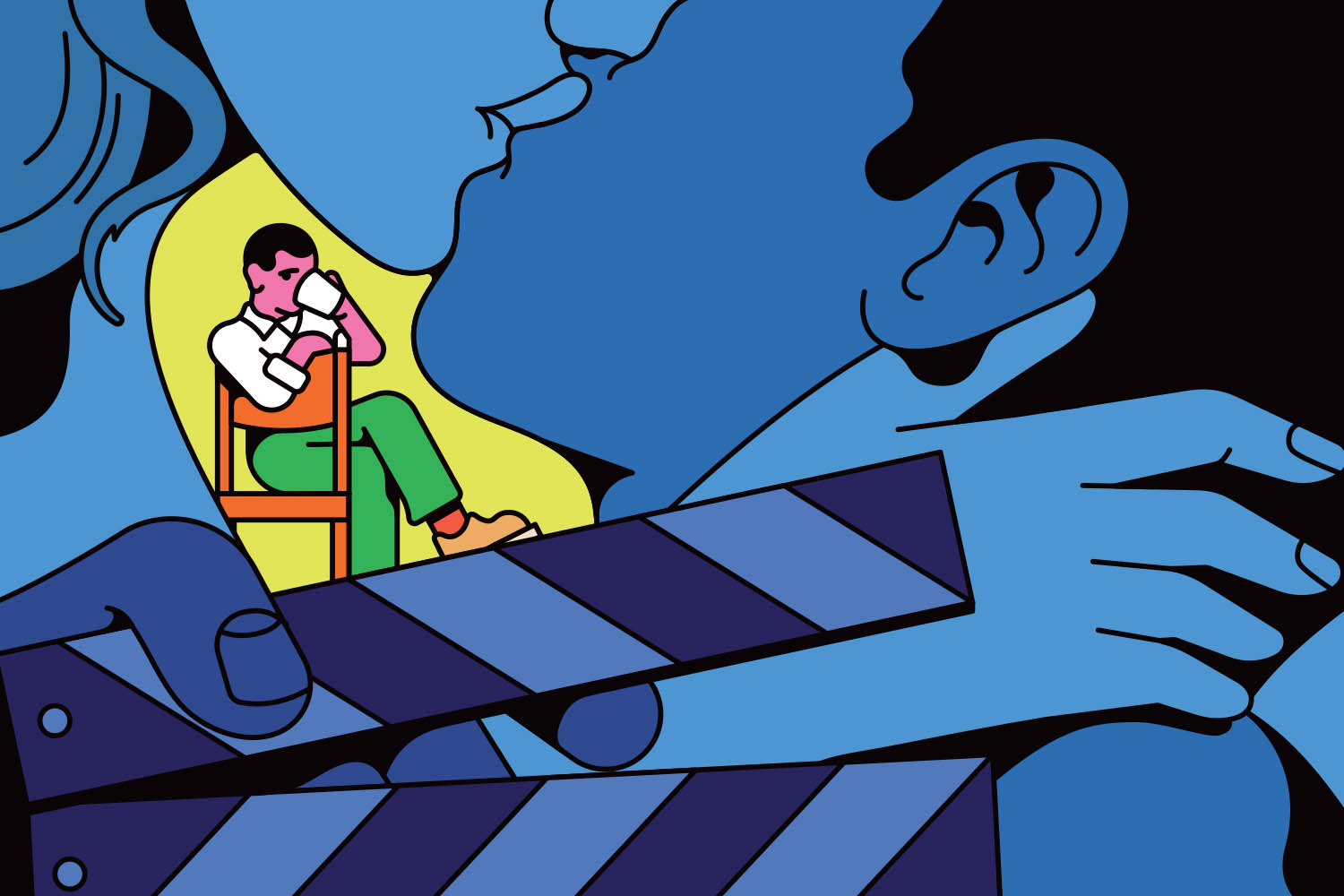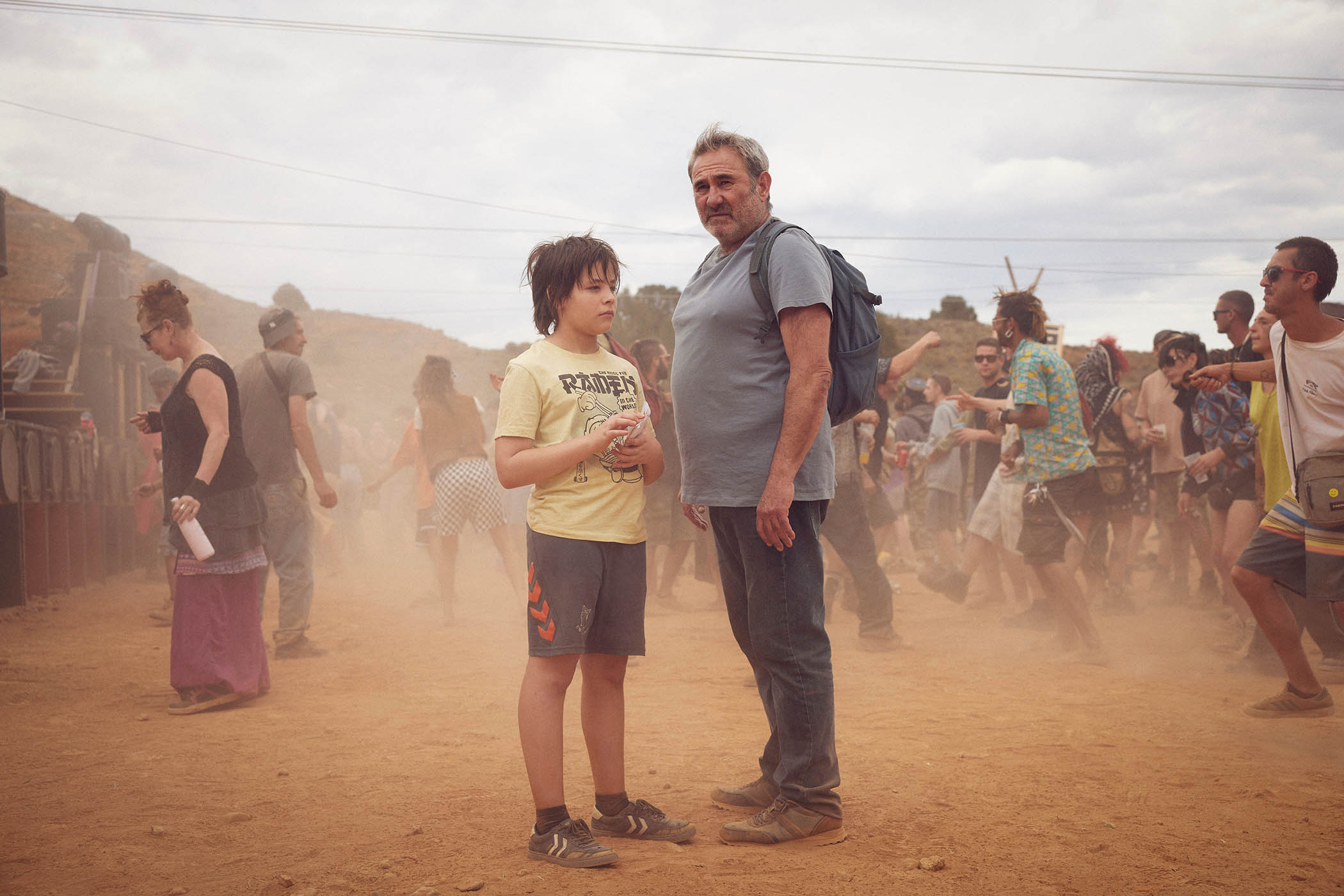Illustrations by Fortunate Joaquin
During an employment lull last October, I told a friend in the film industry I was writing a novel about an extra and asked if he could cast me in a crowd scene for research purposes. After adding a few literary flourishes – an absent dad, scorned lovers, a sexy ingénue – I admitted the novel was a lie, and what I really needed was the money.
A TV crew dispatched me to Blenheim Palace, and within a month I had monetised standing. They wanted 200 extras to stand in the forecourt, providing the background for a series of scenes set at a G7 summit. Banners for the summit hung from the eaves of the palace either side of the steps to the entrance, which were covered in a climbing red carpet. For one scene, Bentleys crawled through imposing iron gates, depositing diplomats. This happened 10 times.
The extras, like the carpet, lent a sense of occasion. We stood and watched. Dozens of freelancers thanked epiphanies like mine – “monetise standing!” – for the opportunity. In gaps between jobs, an assortment of artists, coders and labourers played policemen, caterers and journalists. As one of the extras playing a journalist, I could draw on personal experience. Since quitting a steady job 18 months prior, I’d been telling my wife, my mother and HMRC, “Don’t worry, it’ll be OK, I’m a writer now.” The crew paid me and said to hold a briefcase, but otherwise it was journalism as I’d always known it.
The shoot lasted two weeks. To make it to the set each morning by 5.30am I hired a Peugeot 208, insured to the hilt. The exorbitant cost of the insurance, and lack of any personal stake in the car’s condition, permitted me the luxury of accidentally smashing a wing-mirror and dropping litres of coffee over the footwell. I left my home in Peckham at 3am, winding my way to the Hammersmith flyover on roads empty except for lorries and vans driven by men glimpsed in the dim light of cigarette tips. Sleeplessness flattened the edges between states. At the palace I stood like I drove: lurching.
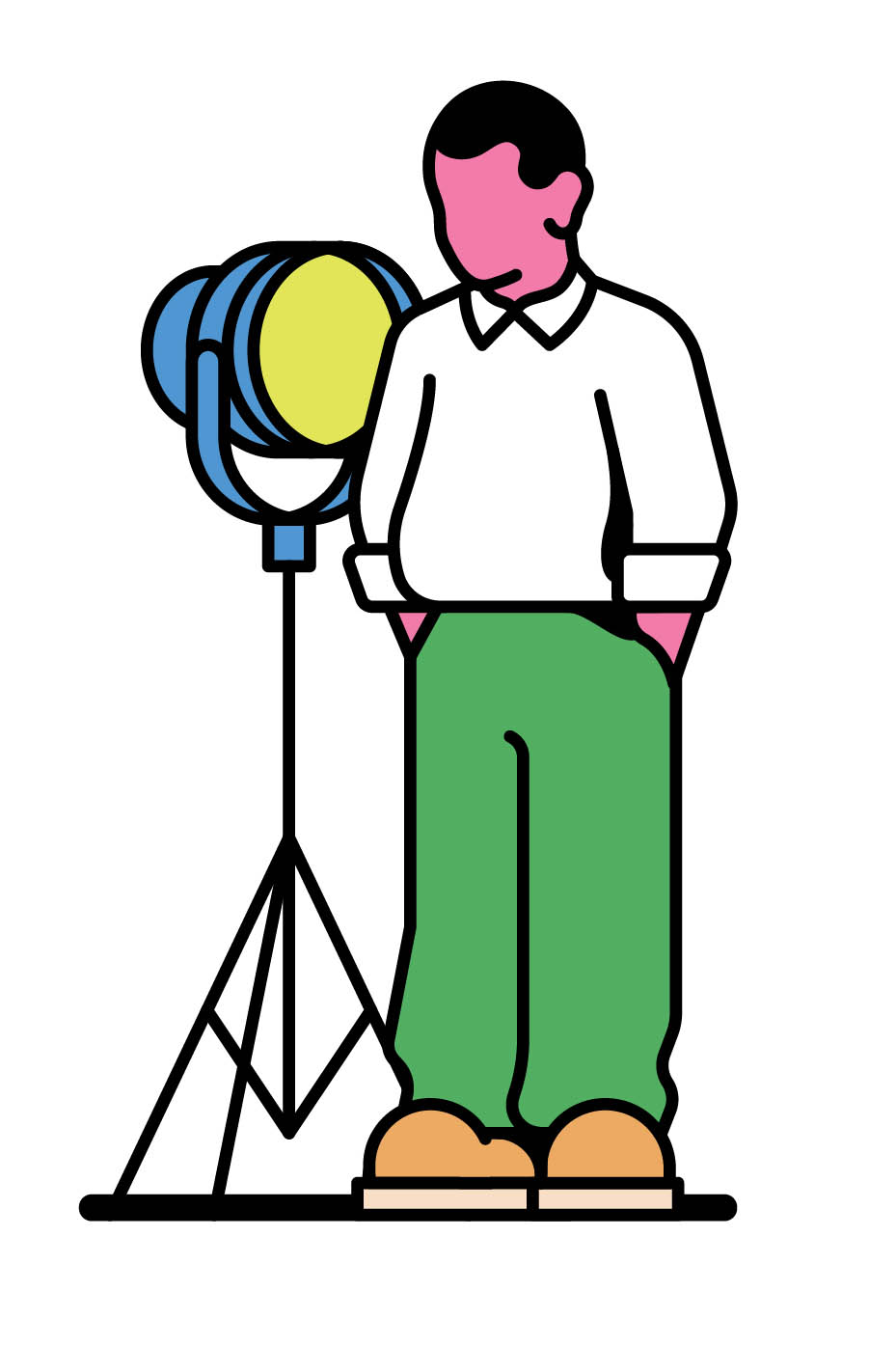
‘I asked a friend if he could cast me in a crowd scene… Within a month I had monetised standing’
The typical extra displayed a similar flair for our primary task and less for those that demanded more. One afternoon in the forecourt, a fireball flipped a Bentley into the air. This was the sign for the extras to start screaming and running in circles. But the scene, the only one to set us in any significant motion, tested even me, whose freelance writing career had supplied 18 months of rehearsal for screaming and running in circles. The director called cut and sent an assistant striding over.
“Better than the last take,” he told the crowd, “but it was a bit…” He paused to search for the right word, “lifeless. That was a car bomb. Some of you will die. Can we try to summon more life?” I looked around at my depressed colleagues, most of whom were nodding with no intention of improving, amazed at their uncanny portrayal of the British press.
“That doesn’t mean run faster,” the assistant director continued, receiving caveats via an earpiece. “Nobody said faster. We don’t want anyone getting hurt, especially the women in heels.” Behind him a continuity supervisor was hosing down the cobbles to simulate rain, and the assistant director gestured at a puddle. “It’s slippery. The point is just to be in shock, OK?”
I’d spent most of that day with a woman in her 60s who was also playing a journalist, but who was dressed by a costume designer who’d never met one, in 4in heels and a shirt unbuttoned to “show some skin”. The temperature peaked at 6C. She shivered constantly, even under the blanket another assistant director suggested using between takes. “The work’s getting better,” she told me, looking out from her cocoon. “They treat us more like humans than they used to.”
‘That was a car bomb. Some of you will die. Can we try to summon more life?’
‘That was a car bomb. Some of you will die. Can we try to summon more life?’
Several extras were hoping to sue Ridley Scott for the conditions on Napoleon. “A cesspool,” I’d heard. As a perfectionist, “Ridley” – all the extras referred to him by his first name – demanded better standing, more standing, standing in the mud, in the cold, over prolonged takes that postponed lunch. To spare him the headache of these complaints, Ridley was rumoured to have vowed “never to shoot in the UK again”.
I wondered if the threat of losing more middling studio fare played into the crew’s new, begrudging civility. We appreciated the pretence, but few laboured under any illusions. Many of the extras described the sum total of their contribution to the production as “a warm body”. Most expected to be replaced by AI imminently and, unique for any occupation, nobody cared. The extras were resigned to their superfluousness, understood they’d milked the industry for all it was worth, and aimed to find new work, presumably as scarecrows.
Yet, straining to be polite, the crew constantly clapped these living mannequins on the back. “What you do is really important,” they’d sometimes say, before adding, “but have you considered doing it this way?” Only the art suffers from such an obsequious attitude: instead of extras thrashed into an authentic simulation of life by a drunken tyrant in the Lars von Trier tradition, the viewers at home watch extras flee a terrorist attack at the speed you’d peel an orange.
Newsletters
Choose the newsletters you want to receive
View more
For information about how The Observer protects your data, read our Privacy Policy
“Run,” begged one assistant director, belonging to the impotent minority who cared, after watching a few of us jog around a corner off-camera. “Run. Keep running.”
Extras are among the only people alive paid not to do, but to be. The scene with the exploding Bentley represented a rare change of pace. Most mornings the 200 extras were dressed in a large marquee, herded by a fleet of minibuses to a conference room of the palace, and told to wait, poised, for that day’s crowd scene. After eight consecutive hours in that position the director cancelled the scene and had the extras returned to the marquee. For that we earned £250 each. Or, collectively, £50,000.
It was enough to restore even a hardened cynic’s faith in capitalism. Extras are also paid for their fittings a month before filming commences. With the persistence of a rendering plant and the subtlety of Queer Eye, the hair, makeup and costume departments transform each extra into a mannequin worthy of TV. I tried on various combinations of journalist costumes in a cavernous, hangar-like space near Maidenhead. Tarpaulin walls delineated the various zones of each department. Enclosed by three such walls, in what was called “the dressing room”, I stood before a mirror reframing my failures as a journalist as failures of branding. Rather than attend meetings with editors dressed in a black shirt, black jeans and black shoes, should I have attended dressed – as per the costume department’s vision of me as a journalist – as Sherlock Holmes?
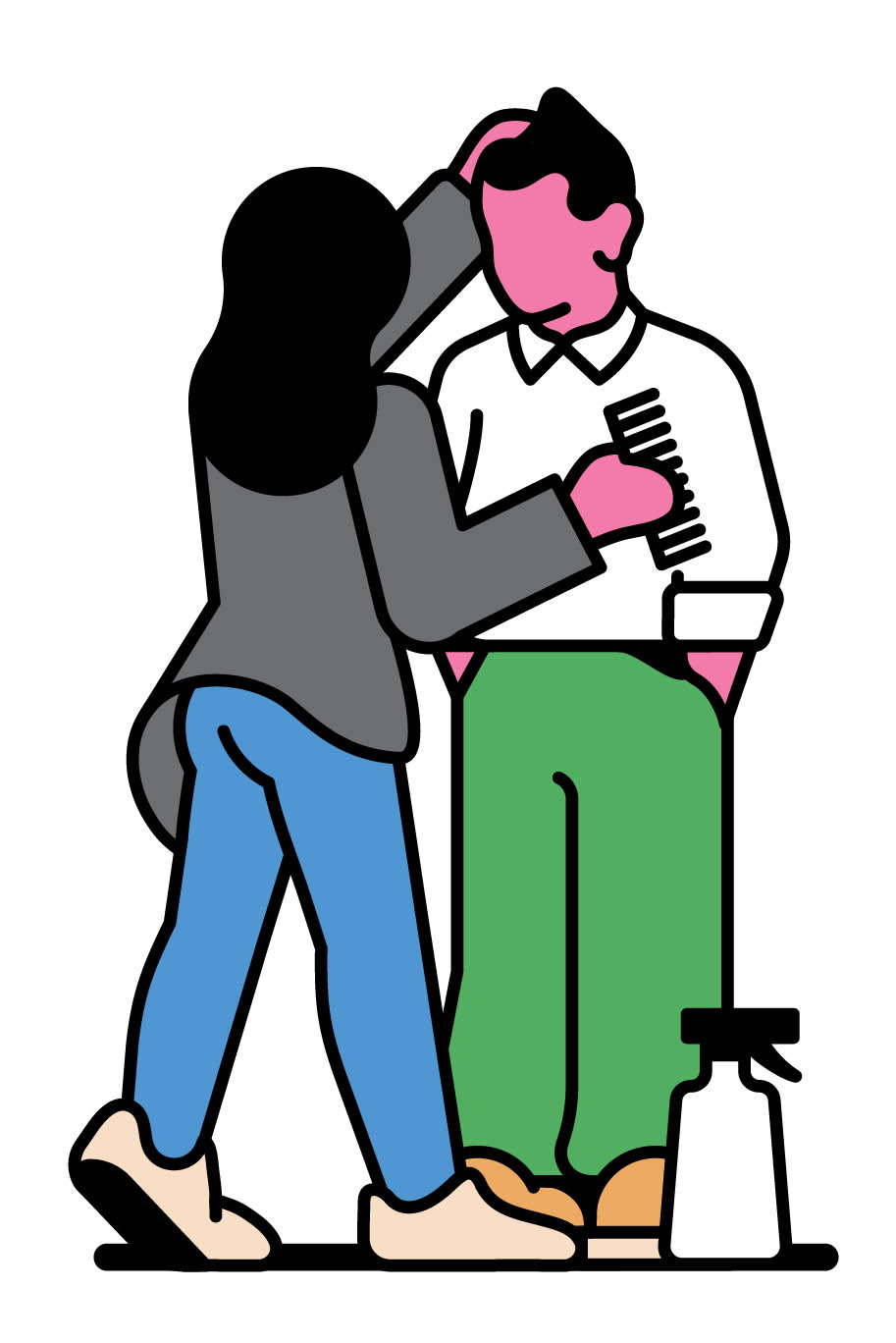
‘The first hairdresser to walk by would straighten an overcurled curl, and the second would recurl the curl’
Below my puffy, hungover face the rollneck looked load-bearing, as if without its support my head might fall off. I ended my fitting sitting in a deckchair opposite another mirror, a hairdresser behind me sighing and shaking her head. She ruffled my middle-parting.
“How do you wear your hair normally?” she asked.
“In a middle-parting,” I said.
“Really?”
“I’m afraid so.”
“Well, in that case, what do you think of this?”
A glob of gel swept my hair back into a middle-parting that fell slightly more leftwards than usual.
“Great,” I said.
“You know, I think I like it?”
We smiled. She took a photo. £75. During the shoot an endless procession of similar women lined the extras up each morning to compare us against those photos for the sake of continuity, thus establishing a foundation to criticise us for failing to “be” ourselves. The first hairdresser to walk by would straighten an overcurled curl, the second would recurl the curl, and a third would murmur, “What is going on with this curl?” before sighing, “I suppose it won’t matter, you’re just a dot in the background.”
Here lies again that singular challenge of the extra: to be. Actors act – as spies, as gladiators. But extras get into the meat of the human condition. For what is the true experience of being but that of the dot, fading into the background? That man holding a briefcase, nodding, smiling.
While recording 15 takes of a scene in which I walked ahead of an actress towards the palace, these thoughts increasingly played on my mind. Was it easy money, being? I’d hoped so, but when asked to walk like a human, I obsessed over walking like a human, which no human ever really does: deconstructing and reconstructing the mechanics of the act until I looked like a confused flamingo picking a course across hot coals. Suddenly, I rued my earlier arrogance, as well as our feeble director.
As the surlier Ridley evidently knew, the difficulty and repressed terror at the heart of being is such that most humans need to be treated inhumanely to suffer the ego death required to approximate the experience for an audience. Why was nobody whipping me into order?
Watching TV that evening I uncovered widespread proof of the difficulty of this art. I kept pausing and rewinding, to study the flamingos flapping in the back of Mad Men. I’d never focused on the backdrop of a TV show before; sidetracked by the quaint fussing of Don Draper, I’d missed the real drama unfolding inches behind him. I’d never confronted what being is so easily reduced to, what that looks like: these clucking men, just a touch out of focus, dragging the Earth’s most withered souls from set to set to set.
As a journalist pretending to be an extra pretending to be a journalist I was forced into a confrontation with the essence of being
As a journalist pretending to be an extra pretending to be a journalist I was forced into a confrontation with the essence of being
The next day I described my difficulty to a notably competent extra during lunch in the palace grounds. The clouds had parted and sun covered the grass and lake. I asked him for his secret, asked him why he enjoyed such a thorny job. “This,” he replied, smiling as he tapped his forehead. “You don’t have to think.”
Broadly, the extras I worked with fell into one of two categories: those hoping to become actors, and those without a more thinking way to make money that day. I might’ve fallen into a third category. As a journalist pretending to be an extra pretending to be a journalist I was forced into an even deeper confrontation with the essence of being, asking not how a human walks, sits and stands, but how I walk, sit and stand. I didn’t know.
Of all the categories, the aspiring actors were, if anything, the worst at entering the necessary zen state of naked being. Hell-bent on earning an extra second of screen time, they sat in the press conference scene taking fake notes in pads as if Pollock attacking a canvas. Of the dots they were playing they asked our assistant directors, “Would my character not have more to say?”
One extra told me about a set where a stoned colleague was fired for lying down. This surprised me; I’d thought the bar was lower. Even the smallest accomplishment – say, remembering to wear the right badge – received warm applause from the assistant directors. “Hey, well done, buddy,” one had said to me in the forecourt, firing an index finger at the badge. But equally, doing something wrong – say, misplacing the badge – received a tonally indistinguishable, “Hey, no worries, buddy, we planned for this, here’s another.” At worst, whenever a member of the crew did lose patience with an extra their strained smile suggested the words, “Well, is this all you’re good for?” and in reply our smiles said, “Well, yes: why else would I be here?”
After years of compromise, that tacit understanding of our inadequacy seemed to be in place. We arrived each morning half-asleep; our standing was like a vertical lying-down. It struck me as quibbling to take issue with the detail of an angle. Might a Zen Buddhist not describe that fired man as standing horizontally? I put the question to the extra who’d told me the story. I looked around at the crowd, leant yawning on walls while the crew lit a new fire beneath the Bentley.
“Can any one of us say we are any better?” He disagreed, saying he’d trained himself to physically sleep on his feet. “That’s an important difference.”
Was it? The insignificance of our roles, combined with the size of the set and sheer number of anonymous men wandering around, would’ve made it easy to simply walk off, hide behind a wall, and get paid for even less. The stoned extra might’ve departed mentally, chemically and aerially, but he’d left the flesh behind, his warm body. Which had to count for something.
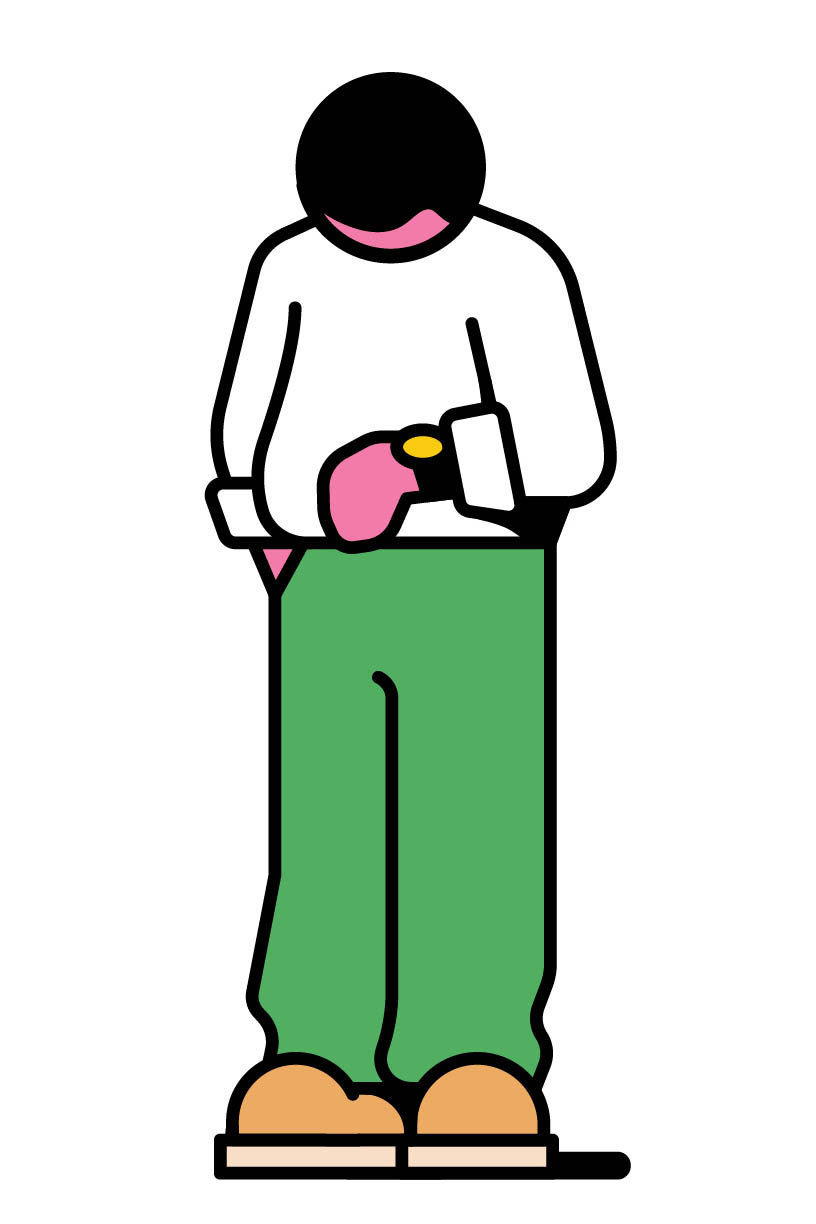
‘Most mornings the 200 extras were dressed in a large marquee and told to wait, poised, for that day’s crowd scene’
What I discovered was the pressure of being gets to people eventually. On a morning midway through the shoot I arrived at the conference room to find an assistant director standing in the centre addressing the extras, arranged around him in various positions of regret. They clutched coffees, shifted their weight in folding chairs, hid vape exhalations down sleeves. After apologising for the crew’s failure to provide us with lunch the previous day, the assistant director asked, “Is there anything anyone would like to air?”
An exhausted man in his mid-50s raised a hand. “Disgraceful,” “hunger,” “Napoleon,” etc. On he went, working himself up more and more about the missed lunch, until finally declaring to the 200 of us, “In fact, yesterday was the worst day of my life.”
The remark was so insane that nobody spoke. Eyes drifted to the vast Renaissance painting hanging on the wall. Even when the caterers did serve lunch it was barely edible. Nonetheless, the assistant director mumbled the crew’s promise to do their very best to serve it going forwards and then left us to our phones and books. The exhausted man remained frozen, staring into the middle distance. Surely he hadn’t really been speaking about lunch, that ghastly aeroplane box of “chicken”? What he’d meant was that every day was the worst day of his life, that his job was to be and that being – existence – is Hell. As an extra he faced that day in day out, while the rest of society, including the crew, distracted itself with doing.
I turned to an extra I’d gotten to know quite well, a widower in his 40s raising a child alone. I asked him if the previous day had been the worst of his life. He thought for a moment. “No,” he said, adding that his worst on a film set was when an extra had suffered a heart attack and died. “They shut production down early that day,” he continued, peeling an orange. “Nobody’s fault, though – the man was morbidly obese. Still, terribly sad.”
Yoel Noorali’s debut collection of essays and short stories, The Kingdom, is available to pre-order via Book Works
